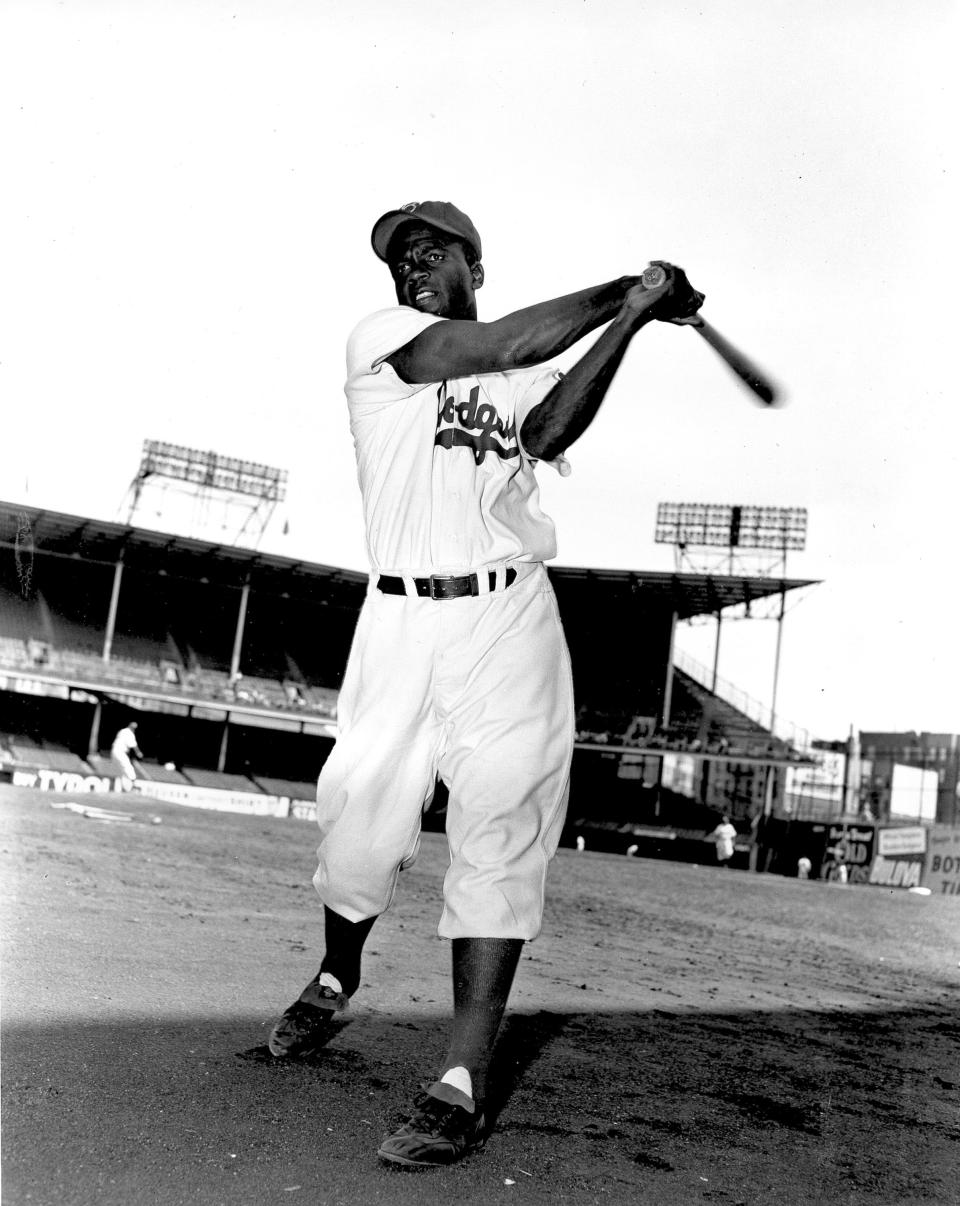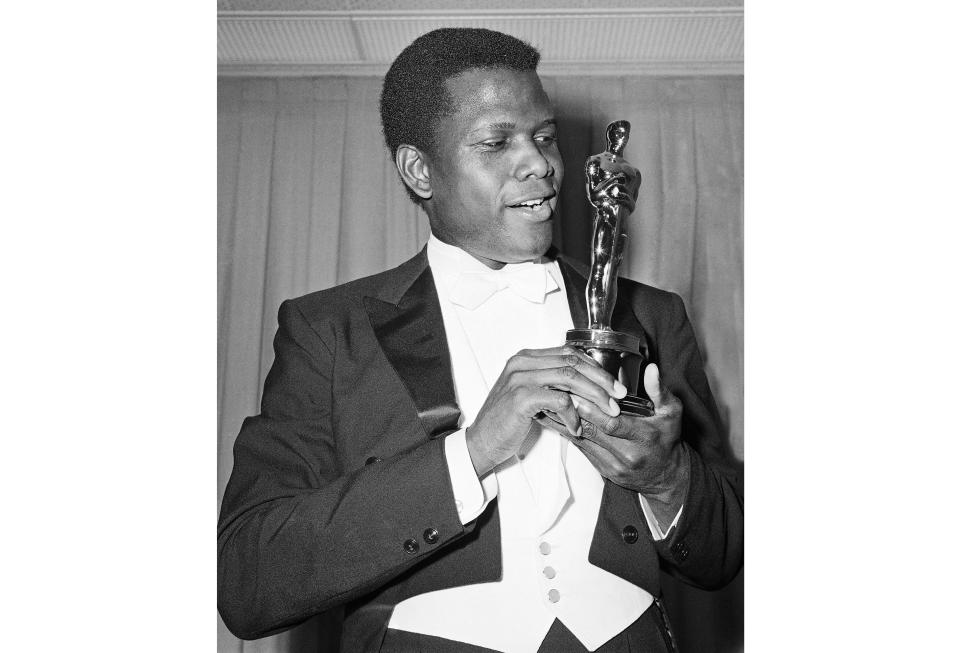The Week in History: April 9-15
- Oops!Something went wrong.Please try again later.
- Oops!Something went wrong.Please try again later.
- Oops!Something went wrong.Please try again later.
- Oops!Something went wrong.Please try again later.
- Oops!Something went wrong.Please try again later.
- Oops!Something went wrong.Please try again later.
- Oops!Something went wrong.Please try again later.
April 9
1682: French explorer Robert de La Salle claimed the Mississippi River Basin for France.
1947: A series of tornadoes in Texas, Oklahoma and Kansas claimed 181 lives.
1959: NASA presented its first seven astronauts: Scott Carpenter, Gordon Cooper, John Glenn, Gus Grissom, Wally Schirra, Alan Shepard and Donald Slayton.
1959: Architect Frank Lloyd Wright, 91, died in Phoenix.
1962: ''West Side Story'' won the Academy Award for Best Picture of 1961; Sophia Loren was named Best Actress for ''Two Women,'' while Maximilian Schell received the Best Actor Oscar for ''Judgment at Nuremberg.''
2011: Minnesota Duluth won a 3-2 victory over Michigan in the NCAA men's ice hockey championship game, the first national title for the Bulldogs.
April 10
1912: The RMS Titanic set sail from Southampton, England, on its ill-fated maiden voyage, stopping first in Cherbourg, France, and then Queenstown (Cobh), Ireland, the next day to pick up additional passengers before heading out into the open sea.
1925: The novel ''The Great Gatsby,'' by F. Scott Fitzgerald, was first published.

1947: Brooklyn Dodgers president Branch Rickey purchased the contract of Jackie Robinson from the Montreal Royals.
1972: The United States and the Soviet Union joined some 70 nations in signing an agreement banning biological warfare.
1983: The Aberdeen Exchange Club celebrated its 12th anniversary as an Aberdeen service club.
1992: Comedian Sam Kinison was killed in a car crash outside Needles, Calif., at age 38.
April 11
1899: The treaty ending the Spanish-American War was declared in effect.
1945: During World War II, American soldiers liberated the notorious Nazi concentration camp Buchenwald in Germany.
1962: President John F. Kennedy held a news conference in which he angrily denounced plans by United States Steel and other steel producers to raise prices (the companies ended up backing down).
1967: The state Game, Fish and Parks Department announced the 1967 pheasant season would open Oct. 21, a week later than the previous year.
1981: President Ronald Reagan returned to the White House from the hospital, 12 days after he was wounded in an assassination attempt.
1987: There was an outbreak of mumps in southeastern South Dakota.
April 12
1861: The American Civil War began as Confederate forces opened fire on Fort Sumter in South Carolina. (The Union troops holding the fort surrendered the following day.)
1912: Clara Barton, the founder of the American Red Cross, died in Glen Echo, Md., at age 90.
1955: The Salk vaccine against polio was declared safe and effective.
1967: South Dakota Game, Fish and Parks Department announced that the first mourning dove hunting season would open Sept. 1.
1981: Former world heavyweight boxing champion Joe Louis died in Las Vegas at age 66.
1987: The Onaka grocery store closed after a 73-year run.
April 13
1742: Handel's ''Messiah'' had its first public performance in Dublin, Ireland.
1860: The Pony Express completed its inaugural run from St. Joseph, Mo., to Sacramento, Calif., in 10 days.

1964: Sidney Poitier became the first black performer in a leading role to win an Academy Award for ''Lilies of the Field.'' (Patricia Neal was named Best Actress for ''Hud''; Best Picture went to ''Tom Jones.'')
1972: The Mobridge School Board said no to a hot lunch program due to the cost of equipment and the necessary remodeling of facilities. Instead, the school planned to expand its sack lunch program.
1987: The ACLU threatened Watertown with a lawsuit if city officials fail to repeal an ordinance banning strippers and mud wrestling within the city limits.
1992: The Great Chicago Flood took place as the city's century-old tunnel system and adjacent basements filled with water from the Chicago River.
April 14
1865: President Abraham Lincoln was shot and mortally wounded by John Wilkes Booth while watching a performance of "Our American Cousin" at Ford's Theater in Washington.
1972: South Dakota's delegates to the Democratic National Convention hired a jet to take them to the Miami event.
1987: Aberdeen Acting Mayor Tim Rich was challenged in the upcoming election by political newcomer Pat Klabo.
2009: Somali pirates seized four ships with 60 hostages.
April 15
1865: President Abraham Lincoln died, nine hours after being shot the night before by John Wilkes Booth at Ford's Theater in Washington. Andrew Johnson became the nation's 17th president.
1912: The British luxury liner RMS Titanic sank in the North Atlantic off Newfoundland at 2:20 a.m. ship's time, more than 2 hours after striking an iceberg; 1,514 people died, while less than half as many survived.
1947: Jackie Robinson, baseball's first black major league player, made his official debut with the Brooklyn Dodgers on opening day. (The Dodgers defeated the Boston Braves, 5-3.)

1959: Cuban leader Fidel Castro arrived in Washington to begin a goodwill tour of the United States.
1968: The South Dakota Board of Regents approved a salary hike for the presidents of the state's colleges and universities. Northern's president would earn $22,500 the next year.
1984: The Wecota Community Post Office was closing after 77 years. Wecota residents would receive their mail by rural carriers through the Faulkton Post Office.
This article originally appeared on Aberdeen News: Historical listing for April 9 to April 22

